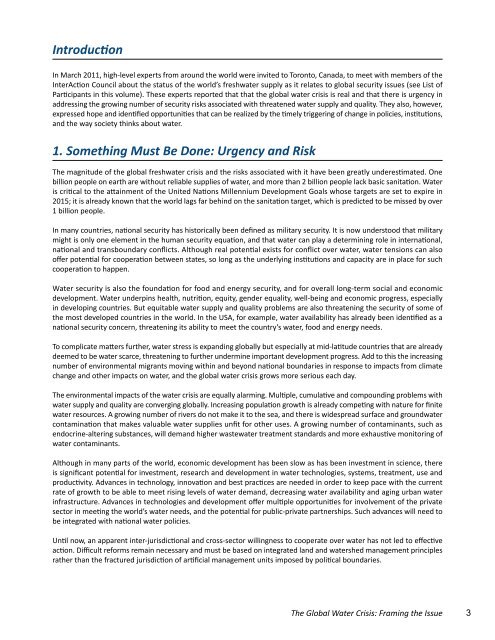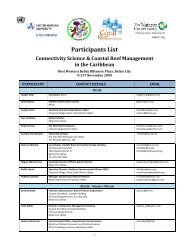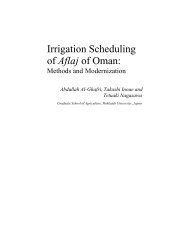The Global Water Crisis: Addressing an Urgent Security - Unu-inweh ...
The Global Water Crisis: Addressing an Urgent Security - Unu-inweh ...
The Global Water Crisis: Addressing an Urgent Security - Unu-inweh ...
Create successful ePaper yourself
Turn your PDF publications into a flip-book with our unique Google optimized e-Paper software.
Introduction<br />
In March 2011, high-level experts from around the world were invited to Toronto, C<strong>an</strong>ada, to meet with members of the<br />
InterAction Council about the status of the world’s freshwater supply as it relates to global security issues (see List of<br />
Particip<strong>an</strong>ts in this volume). <strong>The</strong>se experts reported that that the global water crisis is real <strong>an</strong>d that there is urgency in<br />
addressing the growing number of security risks associated with threatened water supply <strong>an</strong>d quality. <strong>The</strong>y also, however,<br />
expressed hope <strong>an</strong>d identified opportunities that c<strong>an</strong> be realized by the timely triggering of ch<strong>an</strong>ge in policies, institutions,<br />
<strong>an</strong>d the way society thinks about water.<br />
1. Something Must Be Done: Urgency <strong>an</strong>d Risk<br />
<strong>The</strong> magnitude of the global freshwater crisis <strong>an</strong>d the risks associated with it have been greatly underestimated. One<br />
billion people on earth are without reliable supplies of water, <strong>an</strong>d more th<strong>an</strong> 2 billion people lack basic s<strong>an</strong>itation. <strong>Water</strong><br />
is critical to the attainment of the United Nations Millennium Development Goals whose targets are set to expire in<br />
2015; it is already known that the world lags far behind on the s<strong>an</strong>itation target, which is predicted to be missed by over<br />
1 billion people.<br />
In m<strong>an</strong>y countries, national security has historically been defined as military security. It is now understood that military<br />
might is only one element in the hum<strong>an</strong> security equation, <strong>an</strong>d that water c<strong>an</strong> play a determining role in international,<br />
national <strong>an</strong>d tr<strong>an</strong>sboundary conflicts. Although real potential exists for conflict over water, water tensions c<strong>an</strong> also<br />
offer potential for cooperation between states, so long as the underlying institutions <strong>an</strong>d capacity are in place for such<br />
cooperation to happen.<br />
<strong>Water</strong> security is also the foundation for food <strong>an</strong>d energy security, <strong>an</strong>d for overall long-term social <strong>an</strong>d economic<br />
development. <strong>Water</strong> underpins health, nutrition, equity, gender equality, well-being <strong>an</strong>d economic progress, especially<br />
in developing countries. But equitable water supply <strong>an</strong>d quality problems are also threatening the security of some of<br />
the most developed countries in the world. In the USA, for example, water availability has already been identified as a<br />
national security concern, threatening its ability to meet the country’s water, food <strong>an</strong>d energy needs.<br />
To complicate matters further, water stress is exp<strong>an</strong>ding globally but especially at mid-latitude countries that are already<br />
deemed to be water scarce, threatening to further undermine import<strong>an</strong>t development progress. Add to this the increasing<br />
number of environmental migr<strong>an</strong>ts moving within <strong>an</strong>d beyond national boundaries in response to impacts from climate<br />
ch<strong>an</strong>ge <strong>an</strong>d other impacts on water, <strong>an</strong>d the global water crisis grows more serious each day.<br />
<strong>The</strong> environmental impacts of the water crisis are equally alarming. Multiple, cumulative <strong>an</strong>d compounding problems with<br />
water supply <strong>an</strong>d quality are converging globally. Increasing population growth is already competing with nature for finite<br />
water resources. A growing number of rivers do not make it to the sea, <strong>an</strong>d there is widespread surface <strong>an</strong>d groundwater<br />
contamination that makes valuable water supplies unfit for other uses. A growing number of contamin<strong>an</strong>ts, such as<br />
endocrine-altering subst<strong>an</strong>ces, will dem<strong>an</strong>d higher wastewater treatment st<strong>an</strong>dards <strong>an</strong>d more exhaustive monitoring of<br />
water contamin<strong>an</strong>ts.<br />
Although in m<strong>an</strong>y parts of the world, economic development has been slow as has been investment in science, there<br />
is signific<strong>an</strong>t potential for investment, research <strong>an</strong>d development in water technologies, systems, treatment, use <strong>an</strong>d<br />
productivity. Adv<strong>an</strong>ces in technology, innovation <strong>an</strong>d best practices are needed in order to keep pace with the current<br />
rate of growth to be able to meet rising levels of water dem<strong>an</strong>d, decreasing water availability <strong>an</strong>d aging urb<strong>an</strong> water<br />
infrastructure. Adv<strong>an</strong>ces in technologies <strong>an</strong>d development offer multiple opportunities for involvement of the private<br />
sector in meeting the world’s water needs, <strong>an</strong>d the potential for public-private partnerships. Such adv<strong>an</strong>ces will need to<br />
be integrated with national water policies.<br />
Until now, <strong>an</strong> apparent inter-jurisdictional <strong>an</strong>d cross-sector willingness to cooperate over water has not led to effective<br />
action. Difficult reforms remain necessary <strong>an</strong>d must be based on integrated l<strong>an</strong>d <strong>an</strong>d watershed m<strong>an</strong>agement principles<br />
rather th<strong>an</strong> the fractured jurisdiction of artificial m<strong>an</strong>agement units imposed by political boundaries.<br />
<strong>The</strong> <strong>Global</strong> <strong>Water</strong> <strong>Crisis</strong>: Framing the Issue<br />
3




